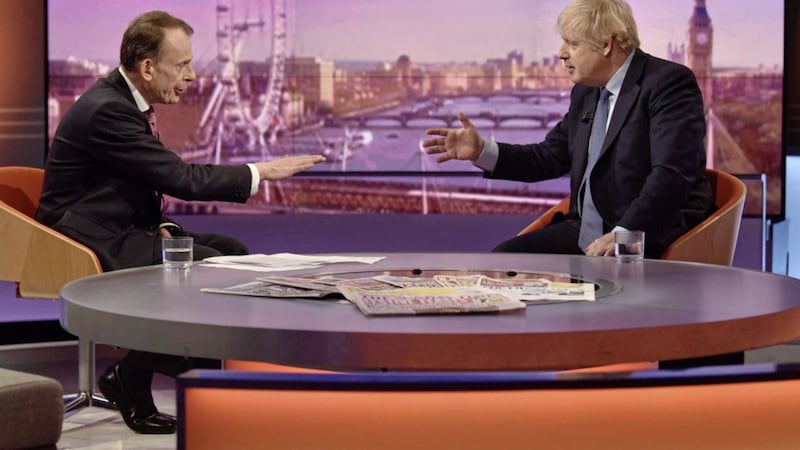IN a campaign already divisive, these have been bad days for politics in Britain.
A weekend that began with the violence of London Bridge continued with almost laughable political gamesmanship, though any laughter would be dark.
As here, the only hope is that voters see through those who would exploit tragedy to inflame and embitter.
When as Britain's prime minister he should have at the very least have tried for calm in the face of a random attack, Boris Johnson went instead for a law 'n' order rant.
A calm and generous pitch would have needed at least the instinct to sound humane, decent. It is not in him.
Instead of voicing sympathy above all for Friday's dead and injured, he chose to have a go at the judicial system (those famously obstructive judges who ruled against his prorogation of Parliament).
Even more impudently and crudely he tried shifting blame to 'a leftie government', the last Labour government, for pioneering early releases that included Friday's killer. Some Labour voices buck-passed right back.
Jeremy Corbyn spoke with more humanity. He did say he could see that police had no choice but to shoot the attacker but decried the Johnson mantra of "lock 'em up and throw away the key".
But then Johnson had also plunged into a parallel universe where he bears no responsibility for Tory government policy before he became prime minister.
Austerity damaged the poorest regions, he says now; after Brexit, struggling companies should get state aid.
As the BBC's reliably acid deputy political editor John Pienaar put it, Johnson did "allow a decent interval (of maybe two or three hours) to pass after the attack" before promising to review the releases of "dozens of terrorists".
He also repeated campaign promises of more police and tougher sentencing. "His answers to Andrew Marr on why it has taken years to do this essentially came down to arguing the Tories were now under new management," said Pienaar.
The cheek of that was matched by the appearance, under his name, of an account purporting to stand up his claims about Labour responsibility.
Tweaked crudely to deliver perversely different conclusions from the original, the account apparently came from 'The Secret Barrister', or so the anonymous blogger claims.
The blog, and a book, deplore the cuts and unreformed failings that make a justice system incapable of delivering justice.
Budget-cutting has increased the damage in already ill-resourced jails and from ill-thought out attempts to reduce pressure on courts.
One English lawyer familiar with today's courts and prisons says that properly understanding how Friday's attacker had been freed would indeed involve threading through judgments, appeals, how sentences had changed, the shifting requirements for parole hearings; "In some ways that guy just fell through the cracks."
Britain is nine days away now from a confused election, argument more poisoned across many fronts than at any time since Tony Blair took his state into war in Iraq.
Corbyn tried over the weekend, without excavating Blair's false prospectus, to re-state his own position.
He had warned that the war would be disastrous for Iraq and its outcome would bring nightmarish retribution to the West.
He was right. The many, many thousands who opposed the war and were ignored may hear him on that, even if they have given up otherwise on him, and Labour.
He also talked about the need for prison to rehabilitate, and is right on that too. Throughout the Troubles the best bit of the prison system here was the education it offered.
Republicans denounced their 'incarceration' but many grabbed the opportunity to be taught, and to study.
Ex-prisoners on both sides, republican and loyalist, by and large became a support system for a peace process, the most persuasive those who gained most from educating themselves.
The central tragedy last Friday was that an ex-prisoner killed two young people trying to encourage him and others towards further education.








